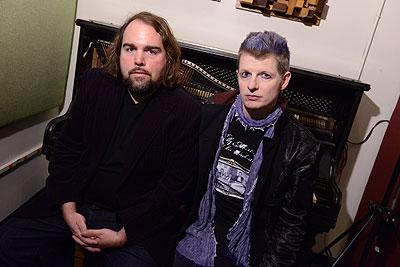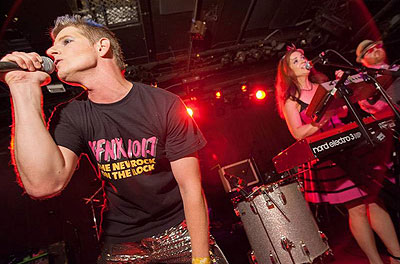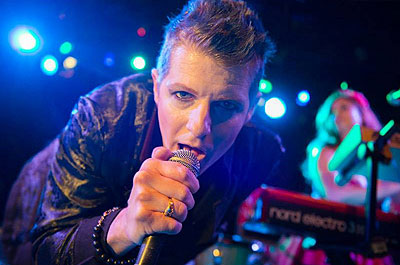On The Airwaves, Postmeridian: Q&A with Glenn di Benedetto of Parlour Bells
Published on July 26th, 2012 in: Current Faves, Music, Q&A |By Chelsea Spear

Nate Leavitt, Glenn di Benedetto of Parlour Bells
Photo © Derek Kouyoumjian
After the Parlour Bells ended an epic set at the funeral for Boston radio station WFNX, former ‘FNX program director Paul Driscoll was heard to say “I think I have a crush on the whole band!” It’s not hard to see why one would become besotted with the rising Boston quartet. Their darkly romantic pop songs engage the listener with anthemic melodies, cinematic arrangements, and seductive vocals. Fans of Orange Juice, Peter Murphy, and Sparks might find room in their hearts for these up-and-comers.
On a balmy mid-July day, I called up charismatic vocalist Glenn di Benedetto to learn more about the Parlour Bells.
How did Parlour Bells come together?
Nate Leavitt and myself have been writing music for many years. We were high school friends, and we were in a band in high school. We’ve been writing music ever since high school, on and off, whether it was in a band or to get together and write songs. Nate had a set of four songs that became part of Heart Beatings. He gave the demos to me, I wrote the lyrics. Early on we weren’t sure what to do with it. We didn’t have a full band, we just had our songs. I came up with the name Parlour Bells, and we decided that anything we wrote together would be under that name. We decided to put together a full band. The formal release party [for Heart Beatings] was January 15, 2011. That’s when we did our first show with Magen and Brendon and Brandon. It’s basically the songwriting partnership of Nate and myself.

Photo © Derek Kouyoumjian
How did you evolve into a full-band format?
We played a couple of shows as a duo with a laptop and some background tracks. While people really appreciated the songs and liked the style, there were a lot of things that we needed to do that required a full band. Personally, I love being in a band with live drums. Even if we to play straight-up electronic music, I’d want a live drummer. To fully expand and be able to play all the songs we were working on and do everything we wanted to do, we needed to put together a full band. We decided there were some really talented players in town—Brendan Boogie on bass, and Brandon Neardos on drums, and Megan Tracy on synths. We couldn’t ask for better players. They’re total pros. They love the music, they love the songs, and they’re totally enthusiastic about the band. That’s exactly what we wanted.
How does having a full-band format influence how you write now?
Nate and I continue to write the songs independently. Usually the process goes, Nate will either compose a song and send it to me, I’ll write the lyrics, or I’ll compose a song with lyrics and I’ll have him remix it, recreate parts with guitars, bass. So we still do the composing and music-writing ourselves, and then we bring a rough demo and take it to the band and they flesh out their parts. We still do the songwriting and the major drafting of the song, and the players bring them to life.
What inspires your lyrics?
“Airwaves,” the most recent song, obviously is inspired by the changes in the radio landscape in Boston, particularly the fall of [groundbreaking alternative station] WFNX. That’s pretty straightforward, that one, although I always try to make things a little more universal. While it’s about ‘FNX, it’s also about radio. It’s also about the way we experience music, and it has a local flavor to it. I’m a big fan of imagery. I try to tell a story when I write.
I love the evocative mood of your song “Bachelor Hours.” I listen to it and I feel like a character in a movie.
We do try and create an atmosphere. I do like to create a cinematic feel to the song, and I’d be playing a character there. “Bachelor Hours” is a good example. It’s definitely taken from the male perspective. It draws upon a lot of those solitary experiences that single people will go through, from my perspective as a man. That’s what we try to do. Someone described [our style] as lounge pop or lounge rock. I think that I personally identify with that. I’m a night person. I do my best work at night. I should say that “Bachelor Hours” is a lot about also getting those things done at night. I do some of my best writing at night. It does have a lot of that bar scene atmosphere, but it also has a lot to do with the things I make at night in my solitary time.
Parlour Bells has the whole package: You have a great look, you have great songs, and you have a great stage presence. Your expressiveness and Nate’s subtlety remind me of the guys from Sparks. How does it all come together for you?
It’s funny that you make that comparison. We’ve been friends for a long time and I think we sort of balance each other out. He holds things down while I will often fly off the handle. Maybe that’s good for a frontman—that’s part of my drama. I like the way he keeps things anchored. That’s been part of our relationship. I’ve been more verbose, and he’s more of a steady hand.
We’ll do the demos. Nate and I will write the songs, we’ll do the demos. We’ll have the band do their parts, and then we go into the studio and we do professional recordings, where there will be live drums and live parts. And then at that point we get them mastered and we’ll upload them to Bandcamp.
The production on your records sounds great. It sounds very clean.
We’ll track drums and vocals at a studio, because studios are great for that. Especially drum sounds, because you really need to do those at a studio, or the right room. Nate’s great with the mixing, so we’ll do that on our own. In the case of “Airwaves,” I recorded a lot of that myself and then I gave it to Nate, and he re-recorded some parts. Sometimes they come together at home, and sometimes they take a little more studio work.
I do all the artwork. We have people we work with for photography. We’re big on social media and getting our name out there that way. In this new musical environment, where a lot of it’s DIY and a lot of it’s self-promotion, we try to be creative about our self-promotion. We try to be clever with the way we push out our product.
How did you get to shoot at the abandoned Boston disco Faces for the sleeve art for Heart Beatings?
We came up with this sort of detective motif. When we were doing Heart Beatings, it was still just Nate and I in the band. So we said “all right, let’s make it a concept. We’ll be detectives.” I came up with the idea of the chalk drawing around the body that the coroners do. With the name Heart Beatings, we said “Hey, we’ll be detectives, and we’ll be standing around this chalk drawing of a broken heart.” And we said “Okay, but we need a crime scene,” so I posted a question on Facebook about “What’s the sketchiest, dirtiest place we can do this to give it a real crime-scene feel?” Somebody suggested behind Faces. We had never been behind there before, but everybody thinks it’s a place where they dump bodies.
I don’t know that it’s actually legal to go behind there, but we did. We went behind Faces, and we got Derek Kouyoumjian to do the photos—he does a lot of photos for the Boston Phoenix. There’s a shot of me holding up a lock of Sophia Cacciola’s hair, and it’s supposed to be evidence of a murder. There’s a song on Heart Beatings called “Gargoyle,” and we put a little calling-card in the grass. We were playing upon the whole Joker thing in Batman where he leaves a card. We tried to conceptualize it a bit and have fun with it. It was cool.
Because we shot all our artwork at the Faces site, when they were actually going to demolish Faces, the real estate developer decided they were going to throw a party on the site. We created an online petition to play at that party, and the Phoenix got behind the idea, and Michael Marotta talked about it on [WFNX local music show] Boston Accents. We actually did get an offer to do a performance there. They did grant our wish to perform there, but they had no power. It actually ended up raining that day, and we didn’t end up playing, because we didn’t want to play a stripped-down set for that. We wanted to do a full-on live rock show. But it was pretty cool that we almost got to do that. We got a lot of support out of the whole thing. Those are the kinds of things we like to do. We like to connect with what’s going on with the community. That’s what great about Boston. If you think outside the music box . . . and be creative with your marketing, you can really turn a lot of people on. You can get stuff where you might not expect it.

Photo © Derek Kouyoumjian
What does it mean to be a Boston band in 2012?
A Boston band in 2012. Well, Boston is a great music community to be part of. Its members are very supportive of one another. I’d have to say that in 2012, where the music industry has changed so dramatically over the past ten to 15 years, Boston’s a great place to be because while it’s easy to get lost in the shuffle of this digital revolution that’s happened, in Boston you have a lot of people who recognize what you do and share what you do and support what you do. I think it’s a good town to be in. It’s a great town to be in, especially these days, because people still appreciate live music. I think there’s still a chance to stand out and there’s still a chance to be heard.
Parlour Bells will be headlining TT The Bear’s Place in Cambridge, MA on July 27, 2012. For more information about Parlour Bells, visit their website.
Time limit is exhausted. Please reload the CAPTCHA.